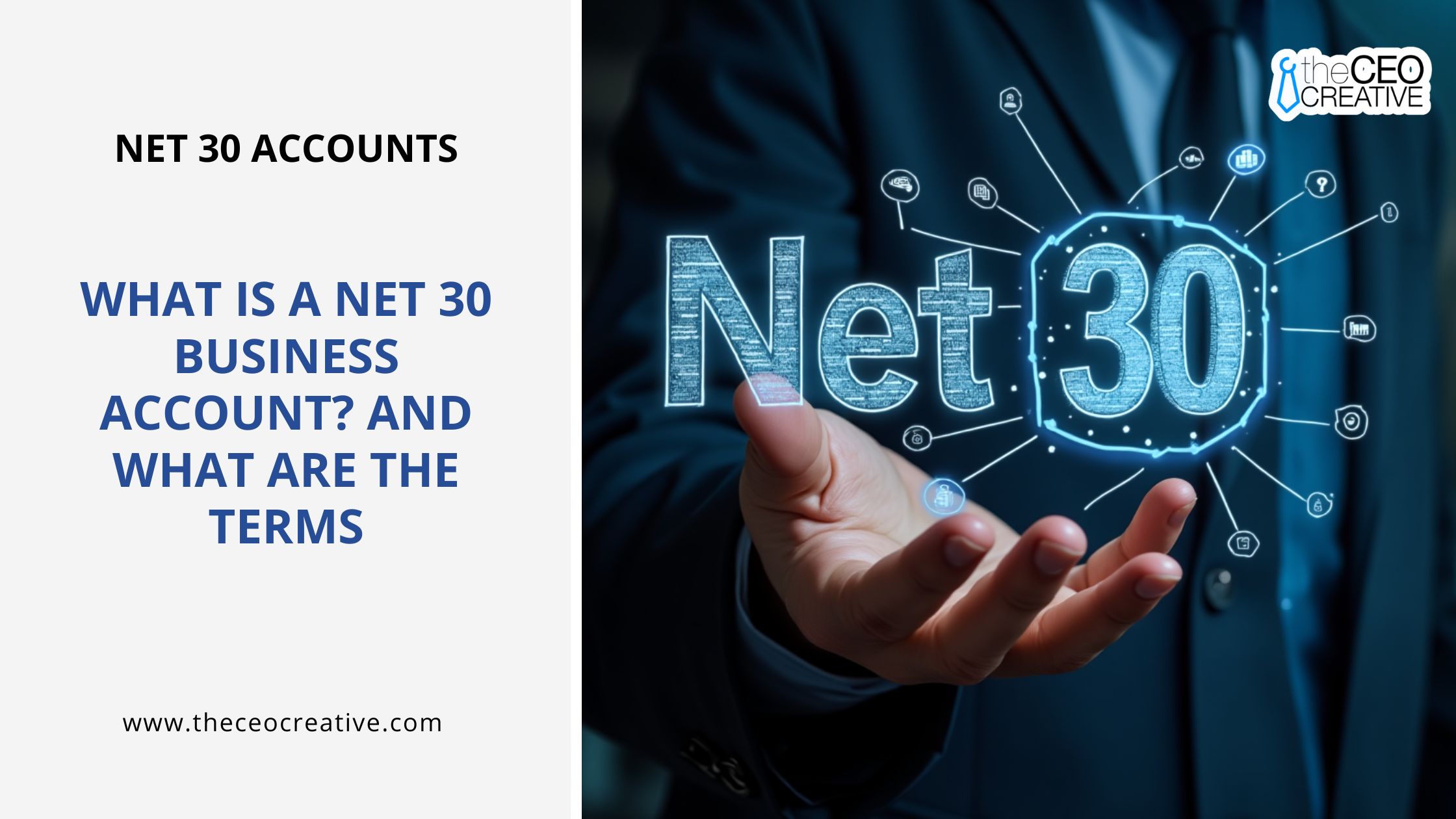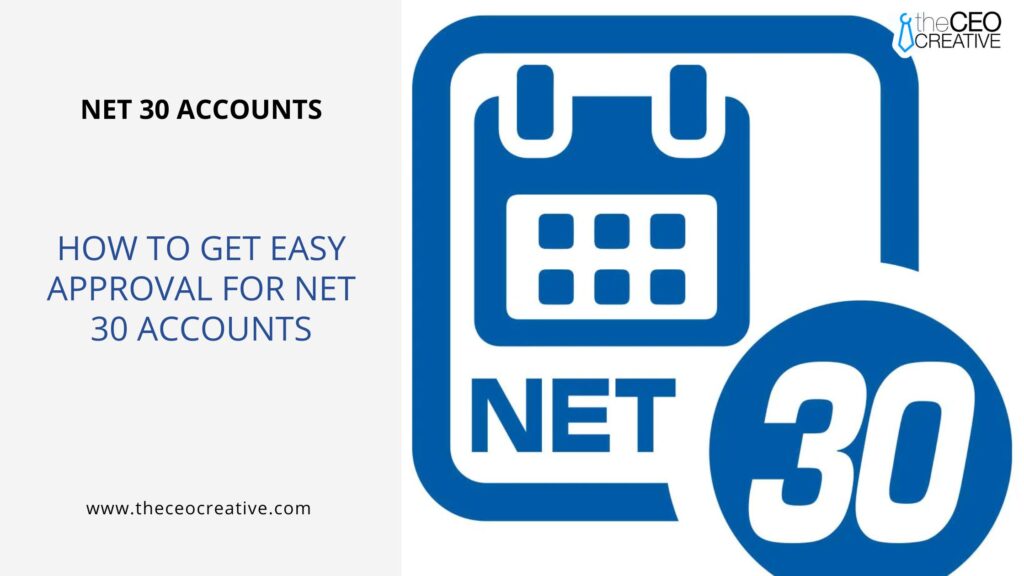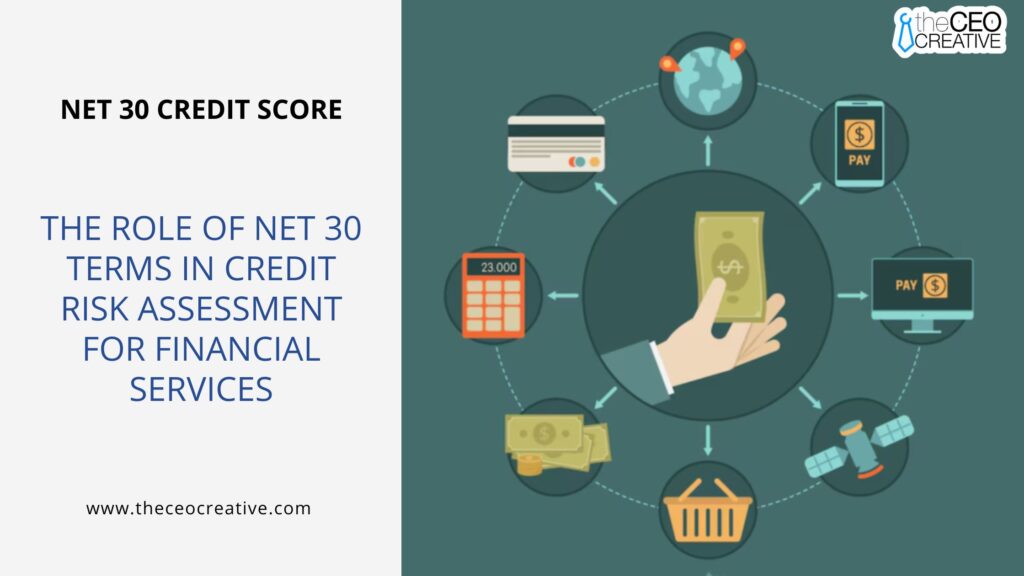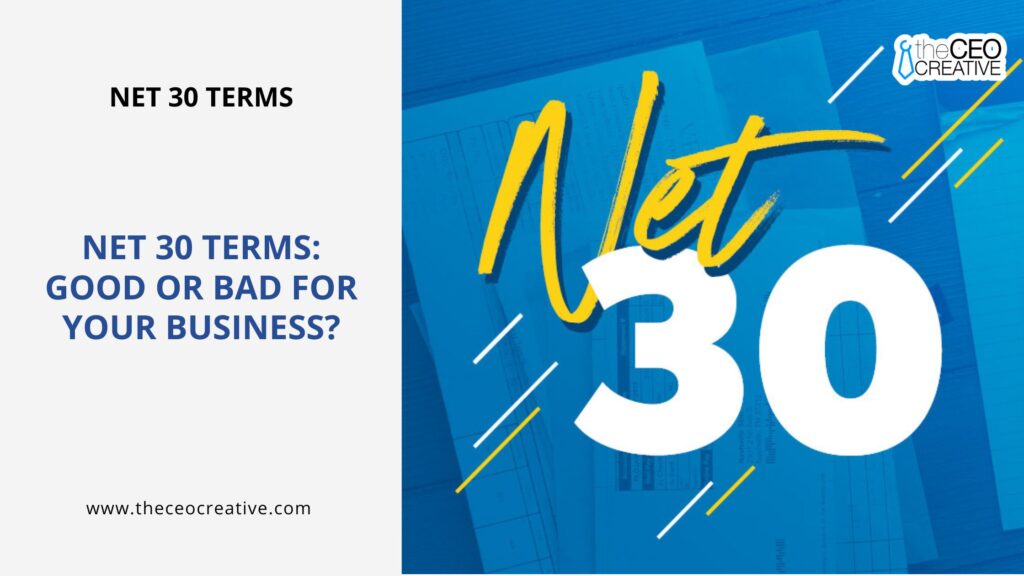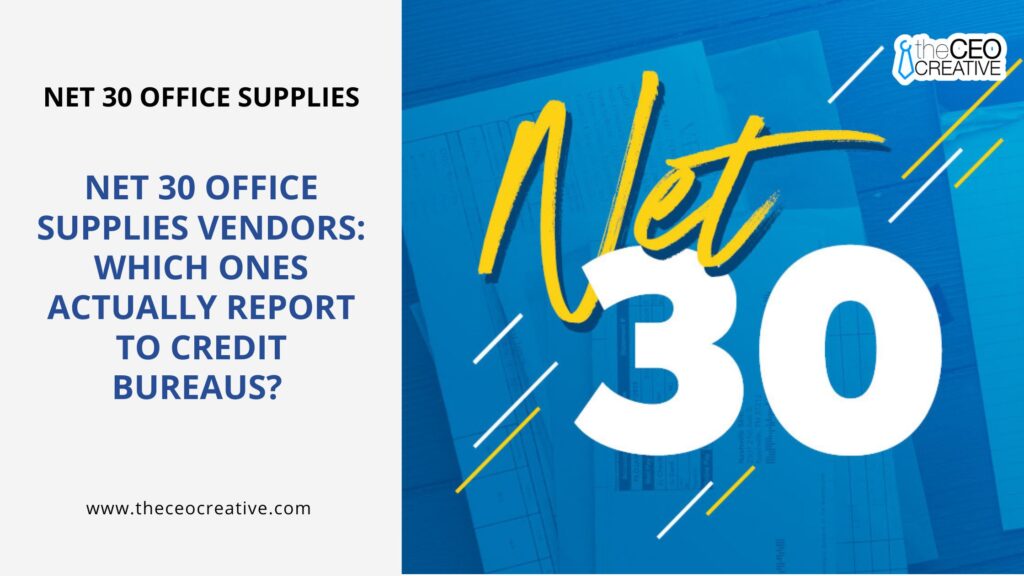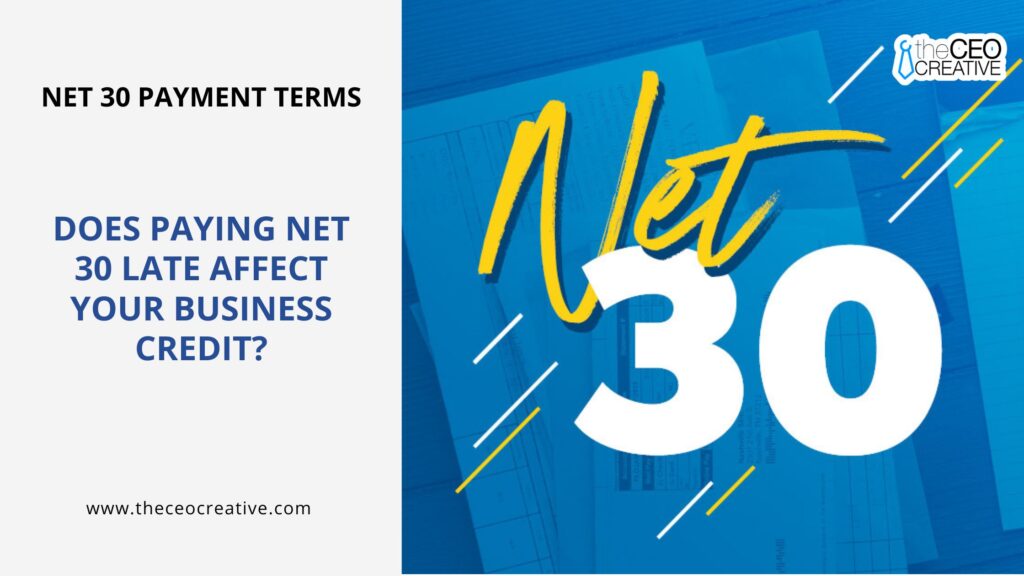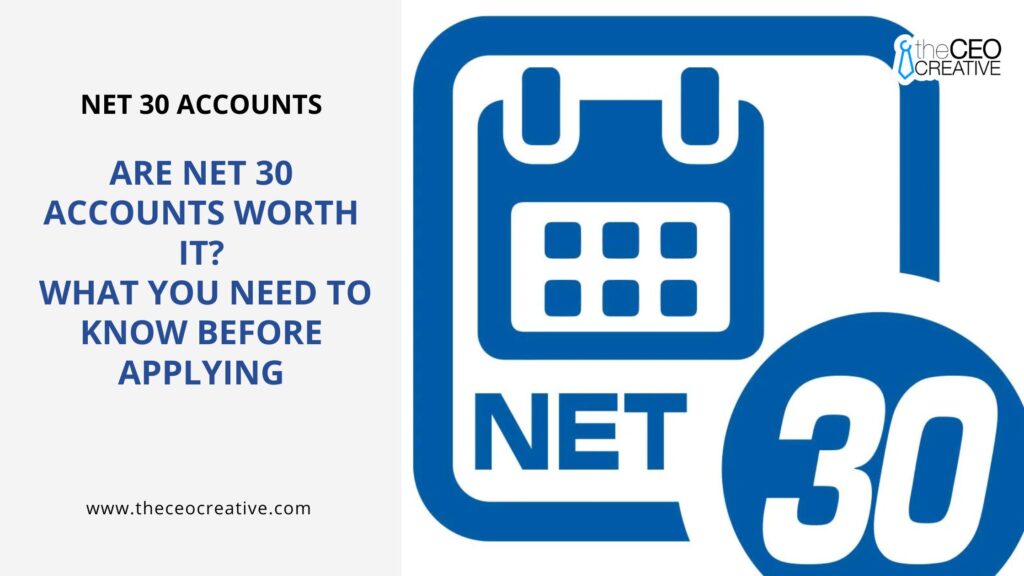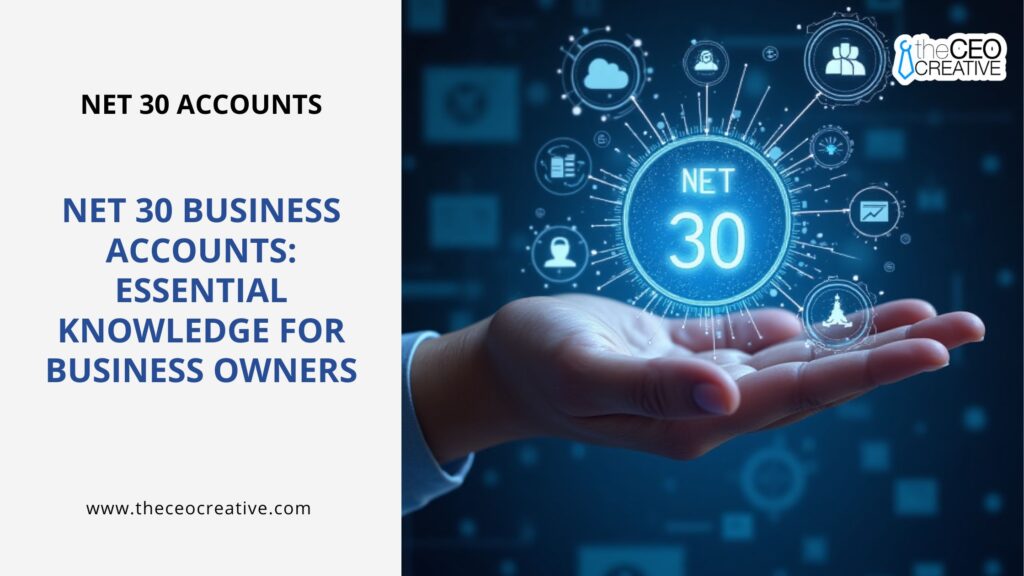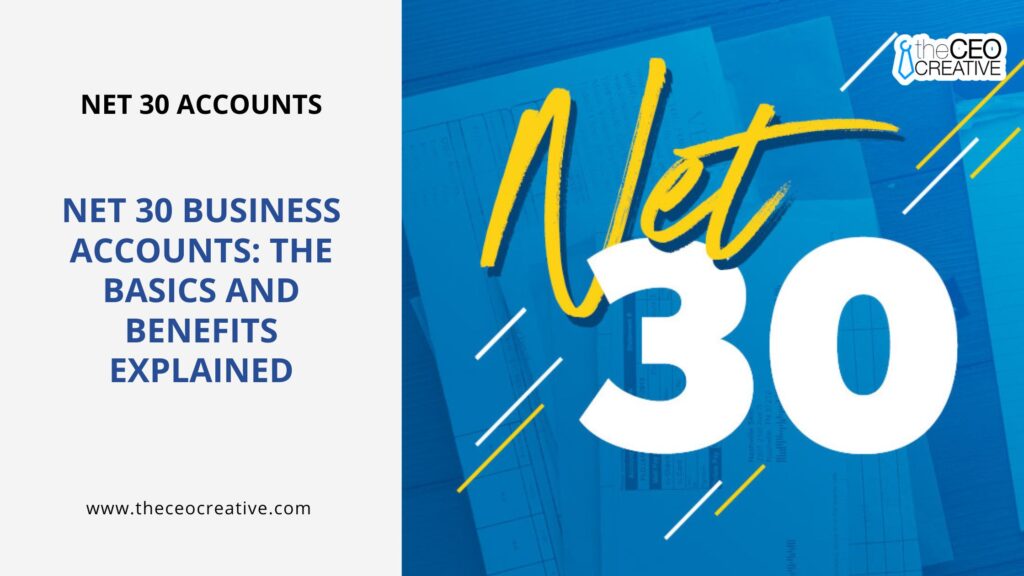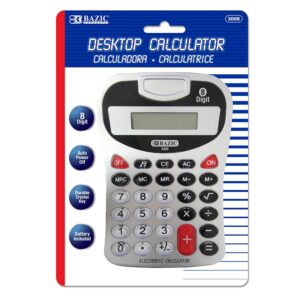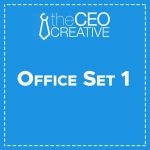So, you’re a small business owner trying to figure out business credit, and you’ve stumbled upon something called a “Net 30 business account.” What’s that all about? Well, basically, a Net 30 business account is a form of credit from your suppliers. It lets your business buy stuff and pay for it within 30 days of getting the bill. Here’s why these accounts are pretty handy:
– Cash Flow Gets Easier: You get a little more time to manage your money, which makes juggling all your expenses less of a headache.
– Your Business Gains Credibility: Paying on time through these accounts helps build your business credit, making your company look more trustworthy.
– Stronger Vendor Relationships: These accounts help you build stronger connections with your suppliers, who really appreciate it when you pay them consistently and on schedule.
By getting a good grasp on Net 30 accounts and using them to your advantage, your business can access a useful financial tool, making things run more smoothly and helping you grow strategically.
Key Components of a Net 30 Account
If you’re a small business owner aiming to grow, getting to grips with business credit options such as Net 30 accounts is vital. But what exactly does “Net 30” entail, and how can it give your business a boost? Let’s simplify it into easy-to-understand chunks.
Definition and Explanation of Net 30
A Net 30 account is a popular form of trade credit where vendors offer a net 30 credit line to their business clients. This means you agree to pay the full invoice amount within 30 days, according to specific net 30 credit terms. Instead of paying immediately, your business can use these extra days to manage cash flow, sell products, or ensure your purchase fits your needs. Understanding the net 30 payment schedule and reviewing your net 30 invoice carefully are key to staying on track.
How Net 30 Terms Work in Practice
Okay, let’s break down how Net 30 terms work in practice. Once you set up a Net 30 account, your supplier will send a Net 30 invoice after you place an order. This invoice clearly states your payment schedule, typically requiring full payment within 30 calendar days of the invoice date. It’s important to review the net 30 terms and conditions on the invoice to understand deadlines, possible discounts, or penalties. For example, if you buy something on November 1st, your payment will be due by November 30th.
– Invoicing: You’ll get an invoice after your order has been shipped or the service has been performed.
– Payment Timeline: The entire payment is due by the 30th calendar day from the invoice date.
– Early Payment Discounts: Some suppliers might give you some money off for paying early, like “2/10 Net 30.” This means you can save 2% if you pay within 10 days.
Ultimately, the goal is to make managing your money in and out a bit easier, letting you run things more smoothly without constantly dipping into your funds.
Common Variations of Net Terms
Net 30 might be a popular payment arrangement, but it’s not the only game in town. You’ll find other options that follow a similar setup but with different deadlines. Let’s look at a few you might see:
– Net 10: This one means the bill is due in 10 days. It’s usually chosen by businesses that operate fast and need payments quickly.
– Net 60 or Net 90: These stretch the payment period to 60 or even 90 days, giving you a longer time to pay those invoices.
– 2/10 Net 30: This deal gives you a 2% discount if you pay up within 10 days.
These different payment terms can be tailored to fit your business’s requirements and cash flow patterns, giving you some leeway in handling your transactions.
Benefits of Using Net 30 Accounts
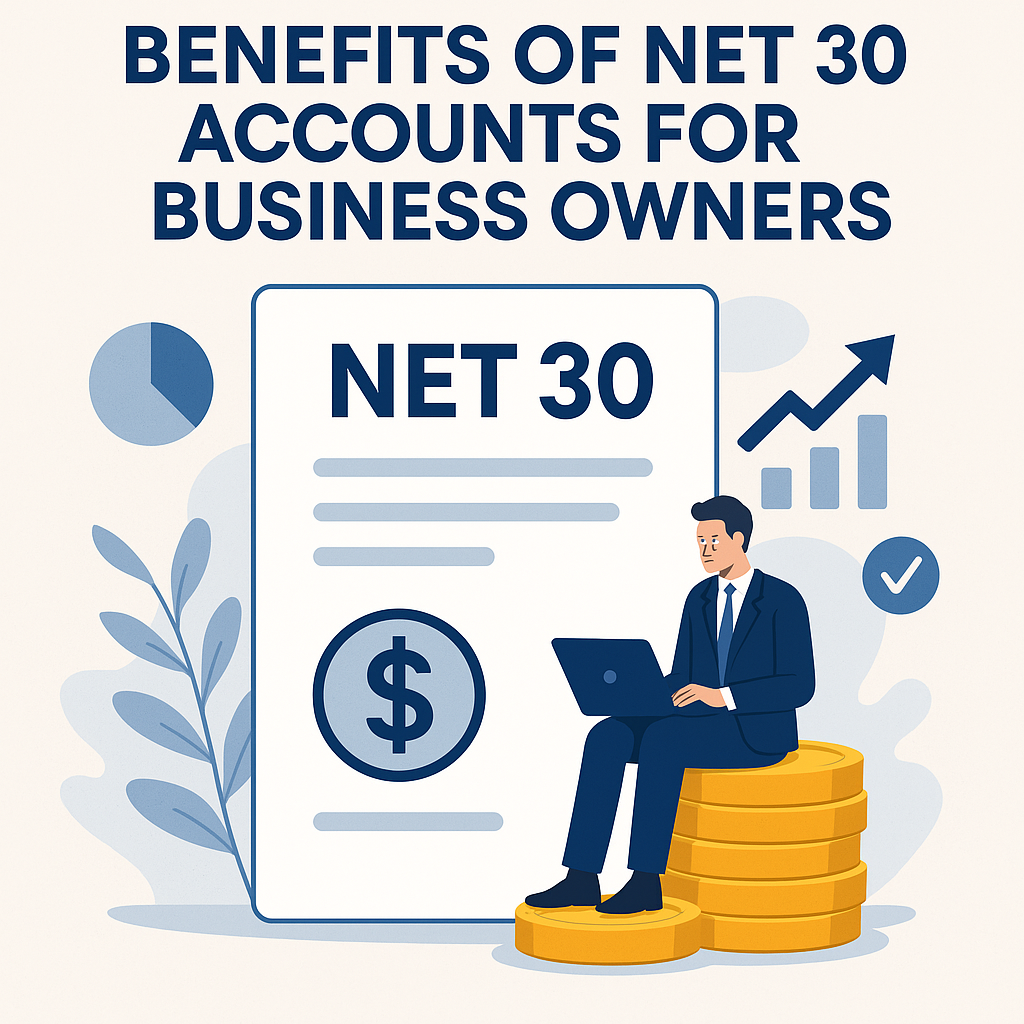
The allure of Net 30 accounts isn’t just about delaying payments—there are several other perks that can make a significant difference in how you run your business. Let’s see how leveraging these accounts can be beneficial.
Improving Cash Flow Management
One of the key advantages of maintaining a Net 30 account with clear Net 30 credit terms is improved cash flow management. A well-understood net 30 payment schedule allows your business to allocate funds strategically while keeping payments on time. Using a net 30 credit line responsibly can also boost your business credit score and strengthen relationships with reliable net 30 vendors.
Evens out your cash flow: You can keep your cash flow more stable and plan your expenses better when you know exactly when payments are due.
Gives you more freedom: Putting off payments gives you some wiggle room to use your money for other important things, like paying employees or buying more inventory, without feeling stretched thin.
Lessens your upfront costs: You can use the money you save for surprising chances or unexpected problems, which is super helpful since running a business can be unpredictable.
When you have more control over your cash flow, your business can afford to make investments or grow at a pace that fits your overall strategy.
Building Business Credit
While managing your cash flow is certainly helpful in the short term, strategically using Net 30 accounts can be a smart move to boost your business’s financial standing over time. Here’s how using a Net 30 account can help you build your business credit:
– Showcasing Your Creditworthiness: Consistently using a Net 30 account and paying your invoices on time demonstrates your company’s reliability. Vendors might even share this positive payment history with business credit bureaus.
– Boosting Your Credit Score: A strong history of responsible credit use can improve your business credit score, which in turn can unlock opportunities for loans, higher credit lines, or more favorable payment terms from vendors and financial institutions.
– Unlocking Better Financing: As your business credit score grows, you’ll likely find that you have access to better financing deals, with more favorable rates, terms, and conditions.
Building your business credit isn’t just about creating a good track record; it’s also about setting yourself up for sustainable growth and a greater ability to weather any financial storms that might come your way.
Strengthening Vendor Relationships
Using Net 30 accounts can really help you build strong, lasting relationships with your suppliers. Here’s the breakdown:
– Building Trust: When you pay on time, consistently, it builds trust with your suppliers. This can often lead to better terms or more personalized service down the line.
– Getting Better Deals: If you’re seen as a reliable business, you’ll have more leverage to negotiate for things like discounts on bulk orders, exclusive deals, or getting first dibs on limited stock.
– Opening Doors for Collaboration: Good relationships with suppliers can lead to opportunities for joint marketing efforts or sharing valuable insights that can benefit both of you.
Having strong relationships with your suppliers can make a real difference for your business, ensuring you have partners who are truly committed to helping you succeed.
To wrap things up, Net 30 accounts are way more than just a way to delay payments. They’re a chance to boost your cash flow, build your credit, and strengthen your ties with suppliers. To really reap these rewards, you need to manage them carefully and stay committed, but doing so can significantly improve your business’s reputation and efficiency. Whether you’re just launching or expanding your small business, knowing about and using Net 30 terms can be a really smart strategy that pays off big time.
Understanding Net 30 Credit Terms and Payment Schedule
It’s essential to understand the net 30 credit terms you agree to with your suppliers. These terms detail your payment schedule, including when invoices are due and any early payment discounts or late fees. Always review your net 30 invoice carefully and read the net 30 terms and conditions before committing. Knowing these details helps you avoid penalties and maintain a healthy credit reputation.
Important Considerations and Risks

Managing your business’s money can be a real challenge, but having a Net 30 account might just make things easier. Of course, with any financial tool, it’s smart to think about the good and the bad before you decide to use it. So, let’s check out some possible problems, how to pick the right vendor, and figure out if your business qualify for a Net 30 account.
Potential Downsides of Net 30 Accounts
Net 30 accounts can be handy, but they come with their share of drawbacks. Here are some potential issues to consider:
– Cash Flow Hiccups: Although Net 30 gives you extra time to pay, it could cause cash flow snags. If your income is irregular, pushing payments further out might leave you struggling to cover other necessary costs.
– Credit Hits: Missing or being late on a payment can hurt your business credit. Regularly botching payments could tarnish your standing with suppliers and make it harder to secure credit later on.
– Fewer Supplier Choices: Since not all vendors extend Net 30 terms, you might find your options limited when buying business supplies or services.
– Risk of Debt Buildup: The credit terms might make you feel richer than you are, but falling behind on payments can quickly snowball into a significant debt problem.
Getting approved can feel like a big hurdle for some businesses. That’s because suppliers usually dig into your credit history before they agree to let you pay later.
Keep in mind, while being able to delay payment is definitely helpful, you want to be sure that spreading out those payments won’t cause you money troubles later on.
How to Choose the Right Vendor
Choosing the right vendors is crucial for maximizing the benefits of your Net 30 account. Consider building your own net 30 vendors list by researching suppliers with strong reputations, industry relevance, flexible net 30 credit terms, and those who report payment history to business credit bureaus. Ensure their product range meets your quality standards to make the most of your net 30 credit line. Here are some things to keep in mind:
– Reputation: Do your homework and go with vendors who have a solid track record of being dependable and offering top-notch customer service. Check out reviews and maybe even reach out to some of their current customers to get a feel for their experiences.
– Industry Specific: It’s a good idea to choose vendors who specialize in your particular industry. They’re more likely to have the products or services that your business actually needs.
– Flexibility: Think about whether the vendor is willing to be flexible with their terms, even beyond the standard Net 30 agreement. Having a little wiggle room to negotiate can be a lifesaver if you need it.
– Reporting: Opt for vendors who report your payments to business credit bureaus. This way, your on-time payments will help boost your business credit score.
– Product Range and Quality: Make sure the vendor has a wide selection of products or services that meet your quality standards. There’s no use taking advantage of Net 30 terms if what you’re buying isn’t up to snuff.
Take your time researching potential vendors – after all, the right vendor can be a long-term partner in your business’s growth journey.
Evaluating Your Business’s Eligibility
Thinking about applying for a Net 30 account? First things first, you need to figure out if your business is actually a good fit. Here’s what to look at:
– Credit Score: Now, a good business credit score isn’t always a must-have, but it definitely helps a ton when it comes to getting approved for Net 30. It’s probably a smart idea to check your score before you apply and work on boosting it if it’s a bit low.
– Business History: If your business is pretty new, it might be a little harder to snag these terms. Vendors usually like to see that a company’s been around for at least a couple of years.
– Proof of Business: Make sure you’ve got all your ducks in a row, paperwork-wise. Think business licenses, your tax ID number, or your incorporation papers. You’ll need these to show vendors you’re the real deal.
– Track Record: If you’ve done a good job handling credit in the past, definitely bring that up when you’re talking to a vendor. They’re more likely to give Net 30 to businesses that show they’re on top of their finances.
Assessing these factors before approaching vendors will put you in a stronger position to secure favorable Net 30 terms.
Steps to Open a Net 30 Business Account
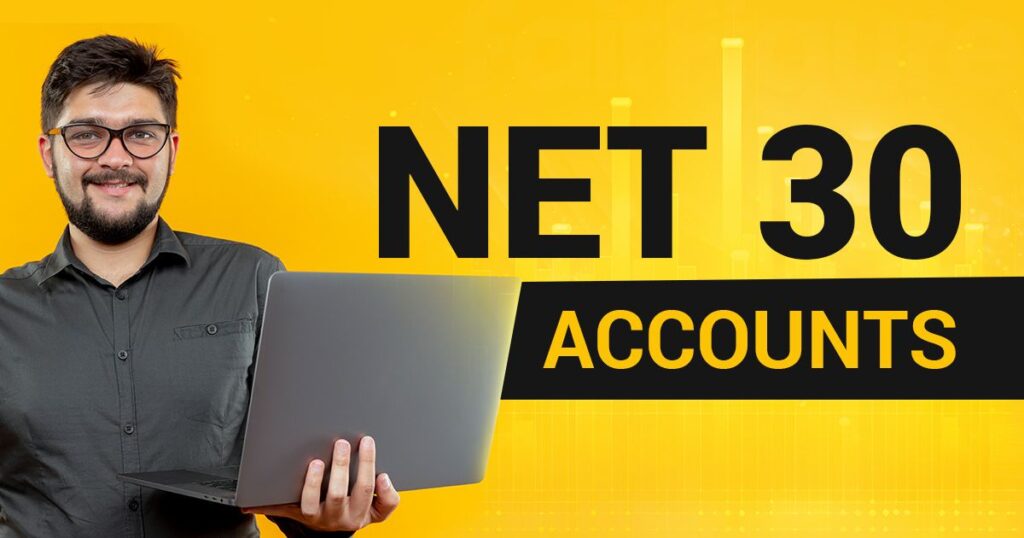
1. Find Suppliers Who Fit Your Bill: Start by making a list of suppliers that offer Net 30 payment terms and are a good fit for your industry. You can use online databases, business directories, and trade associations to find them.
2. Take a Peek at Your Business Credit: Before you apply, it’s a good idea to take a look at your business credit report and make sure everything is correct. If you find any mistakes, fix them, as they could mess up your application.
3. Get Your Papers in Order: Suppliers usually want to see some proof that your business is legit. So, gather up things like your business licenses, tax ID number, and, if you have them, financial statements that show your business is doing well financially.
4. Take a Close Look at Vendor Contracts: After your contract gets the green light, don’t just rush to sign. Give it a thorough read, especially the fine print about payment schedules, what happens if you pay late, and those interest rates.
5. Keep Track of Payment Due Dates: Once those invoices start rolling in, make sure you know when they’re due. Paying on time or even early is super important to keep your reputation and credit score in good shape.
Ultimately, a Net 30 business account can be a great way to handle your cash flow and boost your credit, as long as you’re careful about the agreements you enter. A savvy business owner will assess their needs, pick their partners thoughtfully, and keep a tight grip on their finances to make sure their investment truly pays off down the line.
Conclusion
To put it simply, a Net 30 business account could be a real turning point for your small business. It’s not just about having more time to pay; it’s about building a strong business credit history and creating lasting connections with your suppliers. When you stick to the payment schedule, you show you’re trustworthy and lay the groundwork for better financial chances down the line. If you’re a new business owner or just want to improve how your business runs, looking into Net 30 accounts could be a really smart decision!

